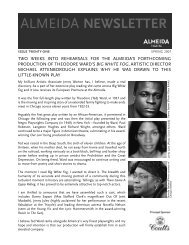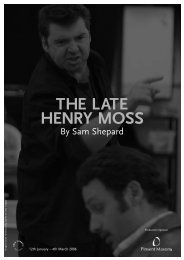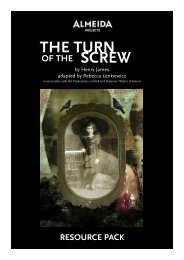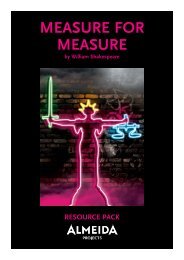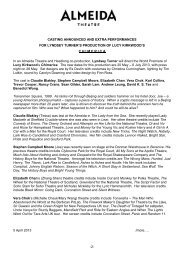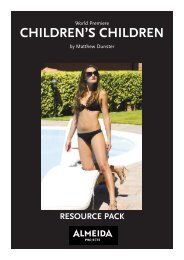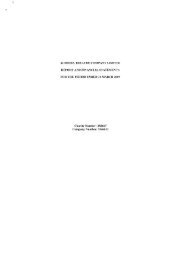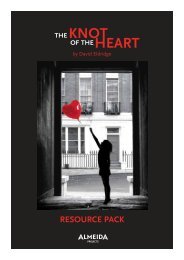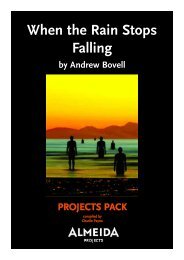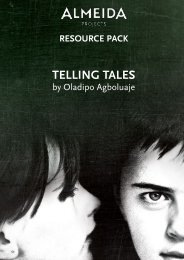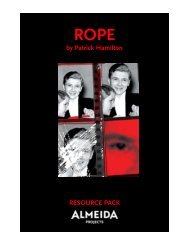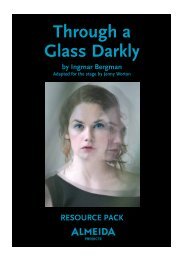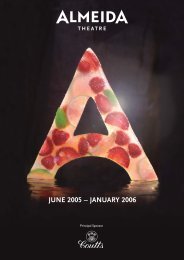Judgment Day - Almeida Theatre
Judgment Day - Almeida Theatre
Judgment Day - Almeida Theatre
Create successful ePaper yourself
Turn your PDF publications into a flip-book with our unique Google optimized e-Paper software.
4<br />
Ödön von Horváth<br />
Christopher Hampton<br />
The critic, Jean-Claude François, memorably described Ödön<br />
von Horváth as “the black book of the Third Reich”: by which<br />
he meant that no other writer documented more<br />
circumstantially than Horváth the day-to-day experience of<br />
life in Nazi Germany in the years leading up to the Second<br />
World War. Bertolt Brecht, for example, sitting in exile in<br />
Scandinavia, wrote of Fear and Misery in the Third Reich, a<br />
title which could have covered any amount of émigré writing;<br />
for those in self-imposed exile, what seemed salient were the<br />
crimes and atrocities of the Nazi régime. But for those, like<br />
Horváth, who remained, what seemed striking was how little<br />
the texture of everyday life had changed, despite the<br />
manifest insanity of the truculently self-righteous posse of<br />
morons so wilfully handed power by the German electorate<br />
in 1933.<br />
At the time of the election, Horváth, then 31, was at the peak<br />
of his career and had a powerful new play Glaube Liebe<br />
Hoffnung (Faith, Hope and Charity), in rehearsal. The play<br />
was not allowed to open, Horváth’s parents’ house in<br />
Bavaria was turned over by the SA [Nazi stormtroopers] and,<br />
like so many other artists, Horváth skipped the country. He<br />
was away for a year: in Budapest, he renewed his Hungarian<br />
passport and in Vienna he married a Jewish opera-singer,<br />
Maria Elsner, to provide her with a passport, he later<br />
explained. Meanwhile, he was routinely attacked in the Nazi<br />
press: when, in 1931, he had won the prestigious Kleist<br />
prize, the Völkischer Beobachter described him as a<br />
“Salonkulturbolschewist” (a high-society Bolshevist) and<br />
accused him of staining the flag of the Reich; and in the<br />
same year he was in court after becoming involved in a brawl<br />
with Nazis in a bar. And yet, in 1934, he headed back to<br />
Berlin. Why?<br />
He wanted to be able to study National Socialism at close<br />
quarters, he said: and so he did. The seven plays and two<br />
novels that poured out in the short time remaining to him<br />
are a compendium of the petty prejudices and rancorous<br />
suspicions of an era of epic mean-mindedness. “It may<br />
seem grotesque,” he wrote, “at a time like this, unstable as it<br />
is, and when no one knows what tomorrow may bring, to set<br />
oneself a programme of writing plays. All the same, I make<br />
so bold as to do so, even though I have no idea what I’m<br />
going to eat tomorrow.”<br />
• • •<br />
<strong>Judgment</strong> <strong>Day</strong> was the last of Horváth’s plays to be<br />
performed during his lifetime. He missed the premiere, in<br />
the unenticing Czechoslovakian town of Mährisch-Ostrau,<br />
where the play ran for only four performances, because he<br />
was hard at work on his novel, Ein Kind Unserer Zeit (A Child<br />
of our Time). Horváth had turned (or returned) to the novel<br />
the previous year, no doubt demoralised by the nearimpossibility<br />
of getting his plays performed in Germany, and<br />
Ödön Horváth c.1919. Reproduced with the kind permission of the Austrian<br />
National Library, ÖLA ÖLA 3L26<br />
had scored perhaps the greatest success of his career with<br />
the novel Jugend Ohne Gott (Youth Without God). This novel<br />
is in many ways a companion-piece to <strong>Judgment</strong> <strong>Day</strong>; both<br />
are built around a protagonist (in one case a station-master;<br />
in the other a teacher of history and geography) who lies<br />
under oath and then is tormented by his conscience until<br />
such time as he confesses; and both have religious and<br />
supernatural elements. Both, in other words, deal with guilt:<br />
and it may well be that Horváth’s project – to describe Nazi<br />
Germany from the inside – brought with it a heavy burden of<br />
guilt. He had been obliged, for example, in order to be able<br />
to take the screenwriting jobs which sustained him in Berlin,<br />
to become a member of the Nazi Writers’ Union, the<br />
‘Reichsverband Deutscher Schriftsteller’, as it called itself<br />
with characteristic self-importance.<br />
Guilty or not, Horváth was punished for his success in<br />
spectacular fashion. In 1938, when, after the Anschluss, he<br />
had finally decided to abandon ship and emigrate to America,<br />
he was invited to Paris to discuss, with the director Robert<br />
Siodmak, writing a screenplay based on Youth Without God.<br />
After their lunch, encouraged by Siodmak, Horváth took<br />
himself off to see Snow White and the Seven Dwarfs in a<br />
cinema on the Champs Élysées. Afterwards, as he strolled<br />
back to his hotel, a sudden storm blew up. Horváth joined a<br />
group of people sheltering under a giant chestnut tree<br />
outside the Théâtre Marigny; a few moments later he was<br />
killed instantly by a falling branch; no one else was injured.<br />
• • •



